- Home›
- Healthy Living›
- Unlock The Surprising Benefits Of White Tea: 17 Proven Revelations
Unlock The Surprising Benefits Of White Tea: 17 Proven Revelations
By: Priyanka Maheshwari Fri, 13 Oct 2023 11:42:36
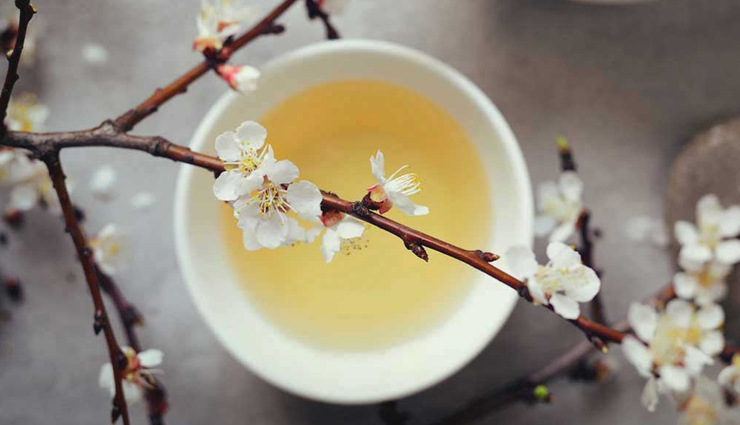
White tea, originating from China, has gained global recognition for its remarkable health benefits. Beyond its calming effects, white tea is packed with essential nutrients and bioactive compounds, making it a powerhouse of wellness. From enhancing skin and hair health to promoting oral hygiene, white tea offers a range of advantages. Discover its types, nutritional profile, optimal usage, and potential side effects in this comprehensive guide. Keep reading to unveil the secrets of white tea's therapeutic properties.
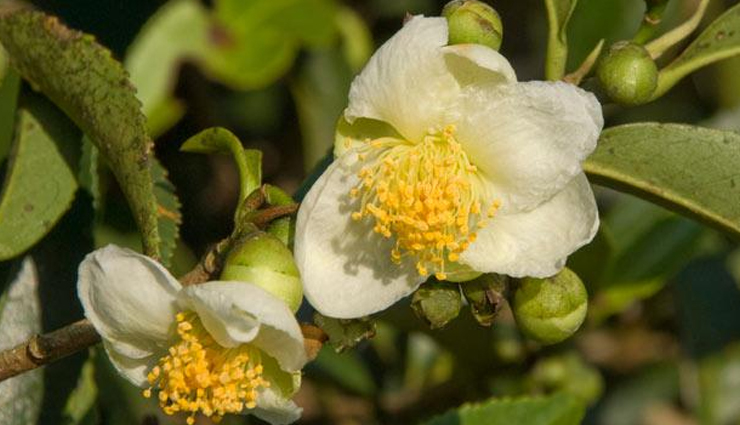
What is White Tea?
Scientific Name – Camellia sinensis
Native – China (Fujian province), Eastern Nepal, Eastern Thailand, Taiwan, Sri Lanka, and India
Delve into the Fascinating Origin of White Tea
The captivating history of white tea dates back 5,000 years to ancient China, where a serendipitous encounter led to its creation. Emperor Shen Nung, while journeying through the countryside, stumbled upon a moment of thirst. Boiled water was brought to him, and fate intervened when a few leaves of white tea accidentally fell into the pot, infusing the water with a unique and delightful flavor. Captivated by the taste, the emperor tasked the locals with unraveling the mystery behind this newfound delight, thus giving birth to our cherished white tea.
But what sets white tea apart? Scientifically, it is derived from the sun-dried buds and leaves of the Camellia sinensis plant, undergoing minimal processing compared to other tea variants. Bursting with essential nutrients, white tea reigns supreme among its counterparts.
Now, why the name 'white tea'? The answer lies in the delicate, silvery-white strings adorning the plant's buds. These strings impart a subtle sweetness to the brew, defining its character. And for those pondering about its caffeine content, fear not. White tea contains a mere 28 milligrams of caffeine per 8oz. cup, significantly less than its black or green counterparts.
Is White Tea Good For You?
Indeed, the benefits of white tea are vast and varied. Beyond aiding weight loss and diabetes management, white tea offers a myriad of health advantages. It promotes healthy skin and hair, combats acne, contributes to cancer prevention, reduces inflammation, enhances liver and kidney health, supports reproductive wellness, maintains heart health, boosts memory, energy, and alertness, aids in hypothyroidism treatment, and improves overall oral health. Its holistic impact on well-being makes it a remarkable addition to one's daily routine.
Types Of White Tea
Understanding the diverse types and varieties of tea is essential in finding your perfect cup. Dive into the realm of teas as we explore the main types of white tea alongside a plethora of other delightful teas available worldwide. Your tea journey begins here.
- Bai Hao Yinzhen (Silver Needle)
- Bai Mu Dan (White Peony)
- Shou Mei (Noble, Long Life Eyebrow)
- Gong Mei (Tribute Eyebrow)
- White Puerh Tea
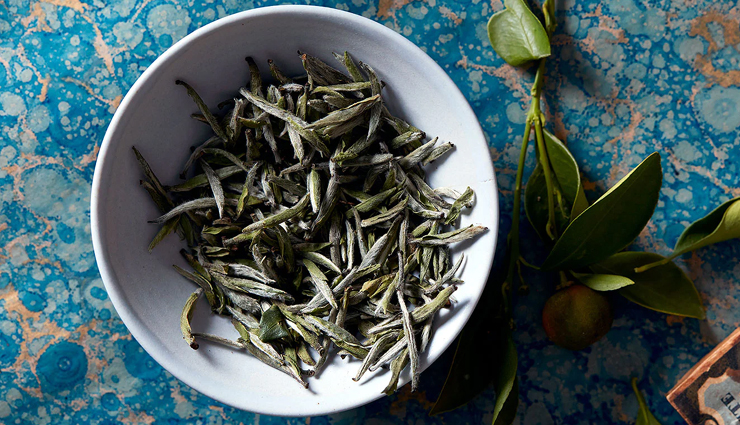
# Bai Hao Yinzhen (Silver Needle) Tea
Hailing as the most esteemed variety in both China and globally, Bai Hao Yinzhen, or Silver Needle tea, is a treasure grown in the lush fields of Fujian Province, China. Its leaves, measuring around 30 mm, are adorned with prominent silvery hairs, earning it the top spot in the world of white teas and making it the most luxurious choice.
The prime plucking time for the finest silver needle tea falls within spring, typically from mid-March to mid-April, during rain-free periods.
When expertly brewed at an ideal water temperature of 75 degrees Celsius, the tea exhibits a pale yellow hue, accentuated by the delicate white hairs adorning the leaves when illuminated.
Characterized by its subtle, fresh, and sweet flavor, the best Silver Needle white tea experience calls for the use of two to three teaspoons of tea leaves and a longer steeping time of five to eight minutes, ensuring a truly delightful infusion.
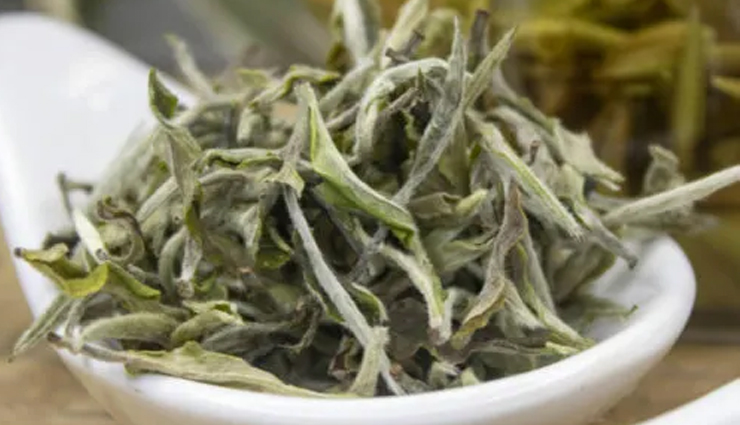
# Bai Mu Dan (White Peony) Tea
Distinct from its esteemed counterpart, Bai Hao Yinzhen, Bai Mu Dan, or White Peony tea, encompasses new leaves and the center needle sprout of the tea plant. Despite being recognized as the more budget-friendly alternative to silver needle white tea, White Peony tea has won the hearts of tea enthusiasts due to its robust flavor profile and accessible pricing.
Similar to silver needle tea, Bai Mu Dan undergoes careful plucking, with a focus on the rain-free spring season. The tea's excellence is derived from the perfect balance of 'two-leaves-to-a-bud,' which, after withering, produces vibrant green leaves destined for your teacup.
Upon brewing, White Peony tea releases a distinct aroma that evokes feelings of tranquility and delight. Its infusion exhibits a charming pale green or golden hue, offering a delightful and fruity taste devoid of any grassy undertones. An experience cherished by tea connoisseurs, Bai Mu Dan stands as a testament to the harmonious blend of flavor and affordability in the world of white teas.
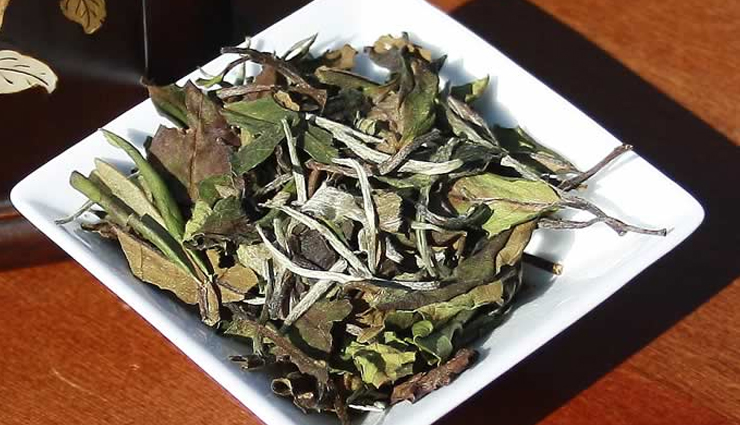
# Shou Mei (Noble, Long Life Eyebrow) Tea
In the realm of Chinese white tea, the exquisite Shou Mei stands tall, sourced from the naturally withered upper leaves and delicate tips of white tea trees. Cultivated in the picturesque landscapes of Fujian Province, China, Shou Mei shares its origins with the esteemed Silver Needle variety, earning global acclaim for its vibrant greenish hue and rich, full-bodied flavor.
Unlike its superior counterparts, the lower-quality variants of Shou Mei may yield a dark golden brew, a telltale sign of their inferiority. Discerning tea enthusiasts are wise to steer clear of these offerings, opting instead for the pure elegance and unmatched quality found in genuine Shou Mei tea. Embrace the essence of nature's beauty with every sip, as Shou Mei reveals the artistry of Chinese white tea at its finest.
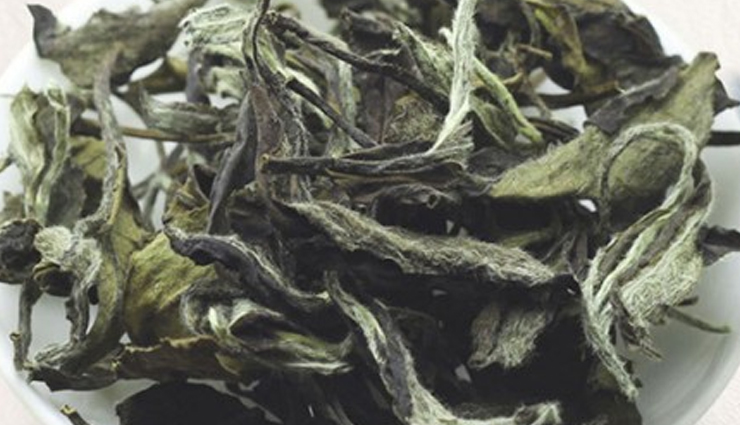
# Gong Mei (Tribute Eyebrow) Tea
In the realm of tea preferences, Gong Mei, known as Tribute Eyebrow tea, occupies a distinguished place, being the third choice for many tea enthusiasts. Derived from Xiao Bai (small white) trees, this tea undergoes a meticulous processing method that sets it apart from its counterparts. The name 'Eyebrows' is attributed to its young leaves, slightly bent in shape, lending it a unique visual charm.
Unlike its counterparts, Gong Mei doesn't feature buds but consists of these elegantly bent young leaves. Upon brewing, it reveals a rich, dark golden hue, indicative of its full-bodied flavor profile. Its robust taste and captivating color make it a delightful accompaniment to dim sums, elevating your culinary experience to new heights.
For those with discerning palates, Gong Mei tea stands as a testament to the artistry and expertise in tea crafting, offering a truly exquisite choice for tea connoisseurs seeking a harmonious blend of flavor and tradition.
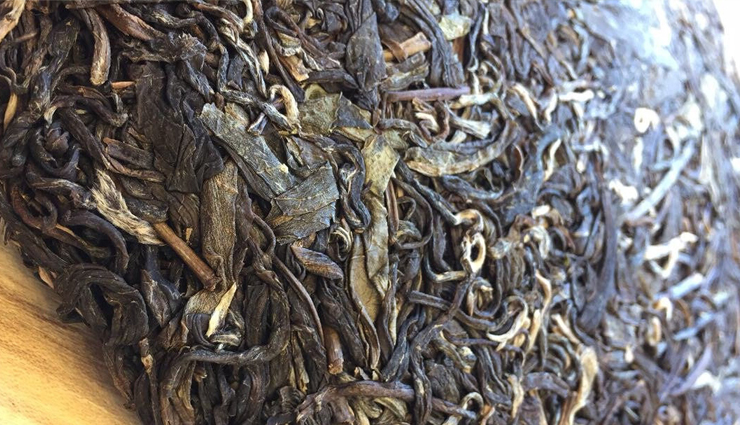
# White Puerh Tea
Nestled in the lofty mountain peaks of Yunnan Province, China, White Puerh Tea emerges as a testament to nature's craftsmanship. Hand-plucked during the gentle embrace of spring, every leaf is carefully harvested by skilled hands, preserving the tea's authenticity and essence.
This exquisite variety is renowned for its opulent and sweet taste, creating a sensory journey that captivates the palate. With each sip, it unveils a symphony of flavors, and its captivating aroma envelops the senses, leaving a lasting impression. White Puerh Tea embodies the artistry of Yunnan's pristine landscapes, offering tea enthusiasts a taste of the region's natural elegance and unparalleled quality.
Other Types of White Teas
As our tea journey unfolds, it's fascinating to discover the diverse world of white tea, spread across the globe. Beyond the traditional varieties, white tea enthusiasts can embark on an exploration of unique blends and regional specialties. Let's delve into this global tapestry and uncover the myriad flavors and aromas that await tea lovers worldwide.
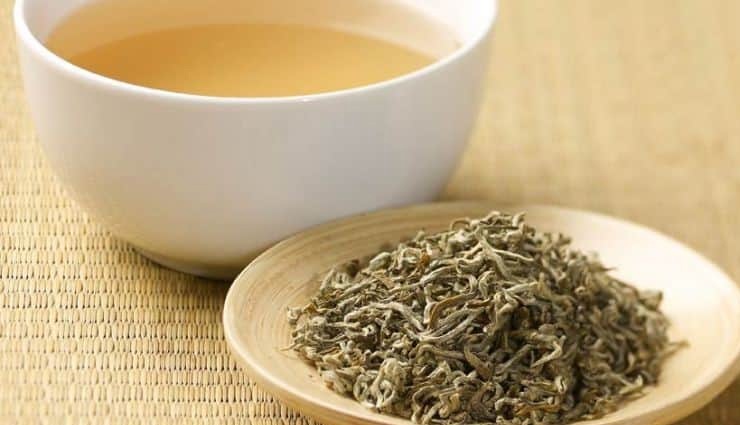
# Ceylon White Tea
In the picturesque landscapes of Sri Lanka, Ceylon White Tea, also known as Silver Tips, emerges as a testament to the island's tea heritage. Cultivated in this serene region, this tea variety stands as one of the finest and most coveted, commanding a premium price tag. Each leaf is meticulously nurtured and hand-harvested, a true artisan's labor of love.
Following the gentle caress of the sun, the leaves undergo a meticulous process. Sun-drying and delicate hand-rolling impart a unique character to Ceylon white tea. The result is a beverage celebrated for its exquisite delicacy, offering a flavor profile marked by its lightness and adorned with subtle coppery hues.
In every cup of Ceylon White Tea, tea connoisseurs embark on a journey of taste, experiencing the essence of Sri Lanka's tea craftsmanship. Delight in the symphony of elegance and savor the unmatched finesse of this exceptional brew.
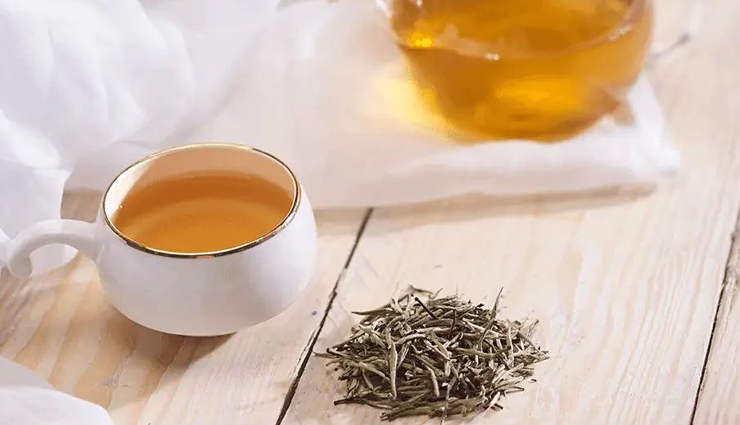
# Darjeeling White Tea
In the misty embrace of Darjeeling's rainy climate, a masterpiece unfolds - Darjeeling White Tea. Crafted with the expertise of artisans, this tea variety mirrors the artistry found in Ceylon white tea. The leaves, nurtured in the lush abundance of the region, are exceptionally fluffy and light, a testament to the unique terroir of Darjeeling.
Much like the sweet nectar of honey, Darjeeling white tea exudes a delightful fragrance, inviting tea enthusiasts into a world of subtle indulgence. Upon steeping, it unveils its true essence - a cup that embodies delicacy, adorned with a pale golden hue. The flavor profile dances gracefully on the palate, leaving a lasting impression of nature's elegance.
Every sip of Darjeeling White Tea is a harmonious blend of craftsmanship and natural beauty. As you embark on this tea adventure, relish the exquisite taste and aromatic richness that define this exceptional brew, a true testament to the magnificence of Darjeeling's tea heritage.
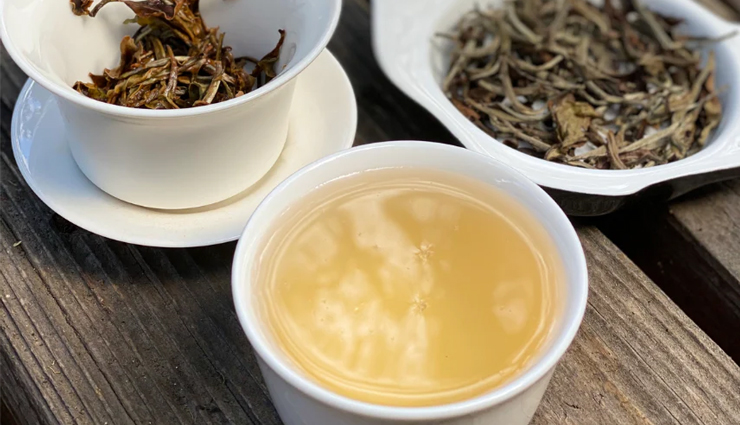
# Assam White Tea
Nestled in the heart of Assam, a rare treasure awaits tea enthusiasts – Assam White Tea. Cultivated in the fertile soils of this region, this unique variety is distinguished by its exceptionally light leaves, a characteristic that sets it apart. Handpicked with precision, these delicate leaves hold the essence of Assam's rich tea legacy.
Upon steeping, Assam White Tea reveals its true nature. The brew exudes a natural sweetness, enveloping the senses with its malty undertones. Each sip tells a tale of Assam's terroir, capturing the essence of the region's pristine landscapes and unparalleled craftsmanship.
A cup of Assam White Tea is not just a beverage; it's a journey into the heart of Assam's tea culture. Delight in the subtlety of flavors and savor the rarity of this brew, a testament to the artistry and dedication of Assam's tea artisans.
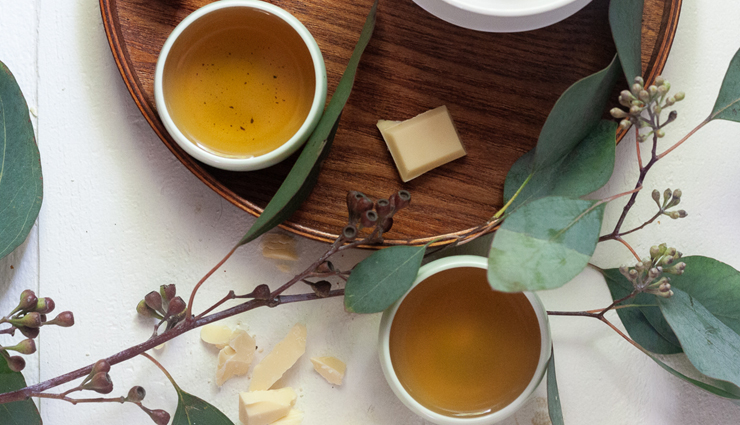
# African White Tea
In the heartlands of Kenya and Malawi, African White Tea unfolds its rich tapestry of flavors, captivating tea enthusiasts with its distinctive allure. This exceptional variety, nurtured in the African soil, carries a flavor profile that stands out among its peers, appealing to discerning palates far and wide.
What sets African White Tea apart is not just its origin but also its caffeine content. Among the white tea varieties, African White boasts a slightly higher caffeine presence, lending an extra touch of vitality to every sip. This energizing characteristic, coupled with its rich taste, makes it a favorite among tea connoisseurs seeking both flavor and vigor.
Indulge in the essence of Africa with every cup of this exquisite brew. Let the robust flavors and the invigorating caffeine embrace your senses, promising a tea-drinking experience that is both distinctive and revitalizing.
Properties Of White Tea
Key Properties of White Tea: Unraveling Nature’s Benefits
White tea, a treasure trove of natural goodness, unveils a spectrum of properties that make it a revered choice among tea aficionados. Let's delve into its essential attributes:
# Antioxidants: White tea boasts an antioxidant profile akin to its green and black counterparts, fortifying your body's defenses against oxidative stress.
# Epigallocatechin Gallate (EGCG) and Catechins: White tea is rich in active catechins, including the powerful EGCG. These compounds play a pivotal role in combating chronic ailments, offering a shield against conditions like cancer.
# Tannins: While white tea contains lower levels of tannins compared to other teas, it remains effective in preventing various health issues, showcasing its protective properties.
# Theaflavins (TFs): These polyphenols contribute to the tea's bitterness and astringency. Interestingly, white tea, with its lower TF content compared to black and green teas, boasts a naturally sweet flavor, delighting the senses with every sip.
# Thearubigins (TRs): Responsible for the rich hue of black tea, thearubigins are mildly acidic. While present in smaller quantities in white tea, they add depth to its character without overpowering its subtle nuances.
But what is so great about white tea? Keep reading!
You can consume white tea just like your regular tea, and reap the many benefits it offers. There are host of white tea health benefits, a few of them have been listed below:

# Unveiling the Weight Loss Potential of White Tea
In an era where the quest for weight loss solutions continues to surge, the emergence of white tea as a promising candidate is a revelation worth exploring. Obesity, a global concern, has led individuals to explore diverse avenues for solutions, and white tea stands out as a potential ally in this endeavor.
A recent German study shed light on white tea's remarkable ability to facilitate weight loss. It achieves this feat by not only incinerating existing fat cells but also by halting the creation of new ones. Less processing, in comparison to its tea counterparts, ensures white tea's higher concentration of ingredients associated with fat-burning, making it an invaluable asset in the pursuit of a healthier weight. The Chinese, custodians of these secrets for centuries, have cherished white tea's health benefits, and the scientific community now acknowledges it as the ultimate health elixir.
The Harvard Medical School recognizes the weight-loss-promoting prowess of white tea, particularly due to its catechin content. These catechins, abundant in all tea varieties, including white tea, are laden with antioxidants that play a vital role in the weight loss journey. Notably, tea catechins exhibit antiangiogenic properties that may act as a deterrent against obesity.
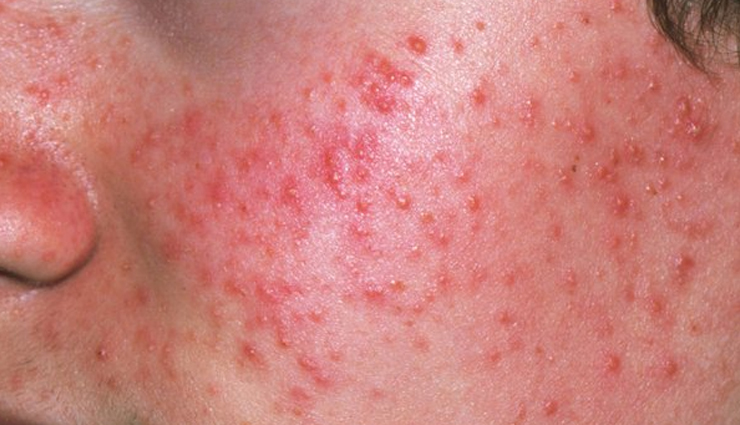
# Your Ally in Acne Battle
In a world where a significant portion of the population grapples with acne-related concerns, the pursuit of effective remedies is ceaseless. While acne might not pose serious health threats, its impact on one's appearance and self-esteem cannot be overlooked.
Enter white tea, a natural solution backed by scientific research. A study conducted at Kingston University, London, unveiled the antiseptic and antioxidant properties of white tea. Dermatologists widely acknowledge the role of antioxidants in safeguarding the skin against cellular damage induced by free radicals, thereby promoting overall skin health.
Harnessing the power of white tea in your fight against acne is remarkably simple. Incorporating one cup of white tea into your daily routine, twice a day, can make a substantial difference. The antioxidants present in white tea act as purifiers, flushing out toxins that accumulate in your body and could otherwise adversely affect your skin, leading to acne.
Moreover, white tea offers a practical topical solution. By boiling two white tea bags and allowing the solution to cool through refrigeration, you create a potent skin toner. Soak cotton balls in this solution and gently apply them to your skin for a few minutes. Follow this with a refreshing rinse using cold water. This straightforward yet effective approach ensures that white tea becomes not just a beverage but a valuable asset in your skincare arsenal, empowering you to face the world with confidence.

# Can Be Beneficial In Pregnancy
The journey of pregnancy is marked by numerous considerations, including dietary choices. White tea, lauded for its antioxidant properties, has found itself under the scrutiny of scientific study in the context of pregnancy.
Antioxidants, as evidenced by research conducted in Scotland, play a pivotal role in shielding cells from heightened oxidative damage during pregnancy. This protective quality renders white tea an appealing option for expectant mothers.
However, the caffeine content in white tea, although lower than in some other teas, including green tea, raises valid concerns. Pregnant women need to be cautious about their caffeine intake. The unborn baby lacks the ability to metabolize caffeine at the same rate as the mother. Excessive caffeine consumption has been linked to increased risks of birth defects, miscarriage, and stillbirth, according to specific research papers.
Navigating this delicate balance requires personalized guidance. It is paramount for expectant mothers to consult their healthcare provider, seeking their expert advice on caffeine consumption during pregnancy. Armed with accurate information, mothers-to-be can make informed decisions, ensuring the well-being of both themselves and their precious little ones.
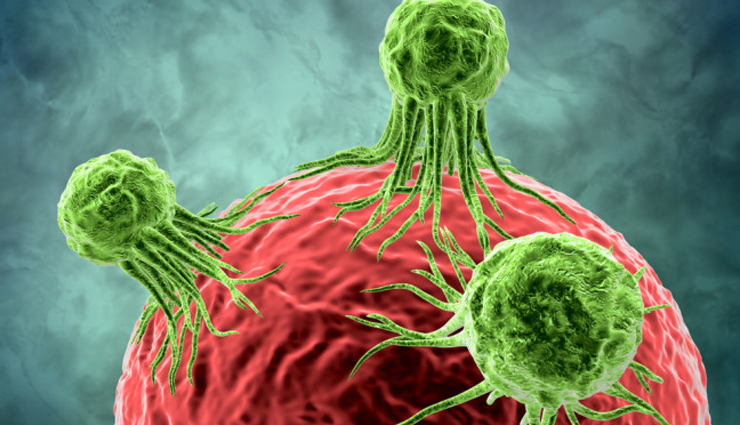
# Helps In The Treatment Of Cancer
In the realm of cancer prevention and treatment, white tea emerges as a promising contender, showcasing remarkable potential against cancer cells. Scientific studies have underscored the effectiveness of white tea, often surpassing its green tea counterpart in combating cancer.
A study published in the esteemed journal Cancer Prevention Research highlighted white tea's superiority over green tea in destroying cancer cells, signifying its formidable anti-cancer effect. Further reinforcing this notion, a Malaysian study illuminated white tea's exceptional antioxidant and antiproliferative effects against cancer cells. Notably, white tea not only eradicates diseased cells but also shields healthy cells from DNA damage, bolstering its reputation as a cancer-fighting powerhouse.
The potency of white tea resides in its rich reservoir of antioxidants and polyphenols, both revered cancer-fighting compounds). Oregon State University emphasizes white tea's distinction as the least processed among its counterparts, preserving its beneficial components. Particularly noteworthy is the presence of EGCG (epigallocatechin gallate), a potent antioxidant found in white tea. This compound, when topically applied, shields skin cells from damage and has demonstrated inhibitory effects on the growth of prostate cancer in American studies.
Catechins, a formidable type of antioxidant renowned for their anti-cancer properties, find their highest concentration in white tea. This places white tea at the forefront of cancer prevention and treatment, making it a valuable addition to the arsenal against this formidable adversary.
In the battle against cancer, the multifaceted attributes of white tea offer not only hope but tangible support, providing individuals with a natural and effective strategy in their fight against this challenging condition.

# Improves Hair And Skin Health
White tea, hailed for its abundant antioxidants, unveils a myriad of benefits that extend beyond mere refreshment. According to the esteemed University of Maryland Medical Center, the anti-inflammatory properties of these antioxidants serve as a shield, fortifying connective tissues and mitigating allergic conditions such as dandruff or eczema.
The wonders of white tea don't stop there. Its rich antioxidant composition proves invaluable in addressing various hair-related issues, including hair fall. The presence of EGCG, a potent antioxidant in white tea, has garnered attention in scientific circles. A Korean study highlighted EGCG's ability to stimulate hair growth in humans, while an American study underscored its role in supporting the survival of hair cells. Additionally, research from Konkuk University in Korea identified EGCG as a vital component in the treatment of scalp seborrheic dermatitis.
White tea's prowess doesn't end with hair; it extends to skin health too. EGCG, often referred to as the "fountain of youth" for skin cells, proves its mettle by offering remarkable benefits for various skin conditions. Studies have shown its effectiveness in combating skin infections caused by drug-resistant gram-negative bacteria. Furthermore, it contributes significantly to skin conditions like psoriasis, wrinkles, rosacea, and wound healing.
Thanks to its high phenol content, white tea works as a natural tonic for the skin, strengthening essential proteins like elastin and collagen found in connective tissues. This fortification not only makes the skin resilient but also helps thwart the formation of wrinkles, bestowing a youthful and vibrant appearance.
Incorporating white tea into your daily routine not only enlivens your senses but also gifts you a healthier, more radiant complexion and luscious locks, making it a treasured elixir for both skin and hair.

# Can Help In The Treatment Of Diabetes
In an era where diabetes has become an unwelcome guest in countless households, the potential of white tea shines as a beacon of hope. Amidst the chaos of modern lifestyles and declining health habits, white tea emerges as a promising contender in the battle against diabetes.
Chinese studies have conducted human trials showcasing the significant benefits of regular white tea consumption for diabetes patients. Additionally, research involving diabetes-induced rats demonstrated that white tea effectively alleviated the symptoms of this pervasive disease.
Diabetes not only affects the body but can also cast its shadow on vital organs like the cerebral cortex, a region crucial for consciousness. A groundbreaking study from Portugal in 2015 highlighted the regular consumption of white tea as a safe and affordable strategy to shield the cerebral cortex from the adverse effects of diabetes.
Furthermore, a separate Portuguese study indicated that incorporating white tea into one's diet could serve as a natural and economical solution to counter the harmful impacts of prediabetes on male reproductive health, although this area requires further exploration.
The credit for white tea's anti-diabetic properties can be attributed to its catechin content, particularly for its pivotal role in treating or preventing type 2 diabetes. As research continues to unveil white tea's potential, it stands as a testament to nature's ability to provide solutions, offering not just a comforting beverage but a shield against one of the world's most prevalent health challenges.

# Enhances Energy And Alertness
In the serene realm of white tea, a unique amino acid named L-theanine takes center stage, imparting both tranquility and mental prowess. Unlike its counterparts, white tea undergoes minimal processing, preserving the highest concentration of L-theanine, a remarkable compound renowned for its calming effect on the mind and its ability to enhance alertness.
L-theanine, found abundantly in white tea, plays a pivotal role in boosting alertness while inducing a serene sense of calm. What sets white tea apart is its lower caffeine content compared to other teas, making it exceptionally hydrating and energy-sustaining.
American studies have underscored the dynamic synergy between L-theanine and a touch of caffeine, showcasing their ability to elevate alertness and combat fatigue. This harmonious combination also demonstrates its prowess in reducing anxiety levels, as confirmed by numerous studies. Additionally, L-theanine has proven its worth by enhancing memory and reaction time, making it a natural cognitive enhancer.
But the wonders of L-theanine in white tea don't stop there. This remarkable amino acid acts as a potent stress reliever, both mentally and physically. By stimulating the production of serotonin and dopamine, vital neurotransmitters in the brain, white tea's L-theanine content not only elevates your mood but also keeps you blissfully alert and happy.

# Helps Reduce Inflammation
In the realm of health and healing, white tea emerges as a potent elixir, thanks to its rich reservoir of catechins, particularly the remarkable EGCG. These catechins act as mighty warriors, not just combating inflammation but also reducing the risks associated with chronic inflammatory diseases such as cancer, diabetes, and atherosclerosis.
Japanese researchers uncovered the extraordinary anti-inflammatory prowess of catechins, revealing their ability to suppress muscle inflammation and hasten recovery after exercise (39). Furthermore, these powerful compounds thwart the effects of factors causing fibrosis, preventing the scarring of connective tissues, often resulting from injuries.
At the heart of white tea's anti-inflammatory magic lies EGCG. This incredible compound not only bolsters immunity but also combats related ailments like cold and flu. It serves as a natural shield, annihilating various bacteria and viruses, including the influenza virus. Moreover, EGCG wages a relentless battle against atherosclerosis, a condition triggered by inflammation due to environmental pollutants, safeguarding our arteries and promoting cardiovascular health.
In the comforting warmth of a cup of white tea, nature's anti-inflammatory secret unfolds, offering not just a delightful taste but a symphony of healing, protecting us from the onslaught of inflammation and its detrimental consequences.
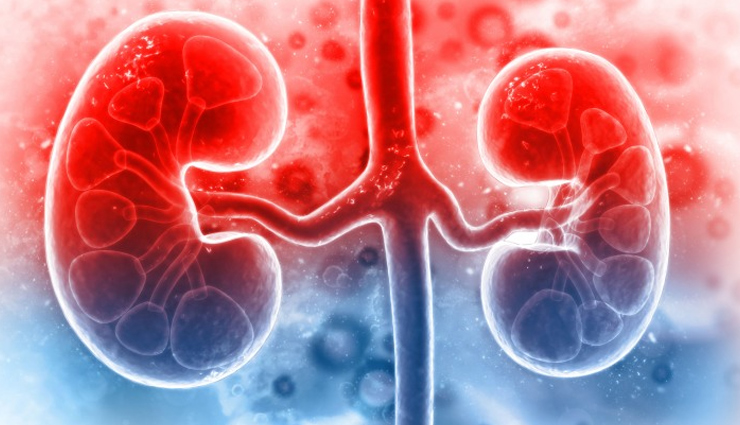
# Can Be Beneficial To The Kidneys
In the face of modern challenges and environmental pollutants, white tea emerges as a steadfast guardian of our kidneys, shielding these vital organs from harm.
In a compelling Polish study conducted in 2015, the consumption of white tea was intricately linked to the reduction of adverse effects inflicted by environmental pollution on the human body, specifically targeting the kidneys. This research underscored the tea's remarkable ability to counteract the detrimental impact of environmental toxins on our renal system, promoting kidney health and resilience in the face of adversity.
Delving deeper into the intricate world of antioxidants, a study in Chandigarh, India, illuminated the pivotal role of catechins in safeguarding against renal failure, acting as powerful defenders of our kidneys. Through their potent antioxidant activity, catechins form a robust shield, fending off the threats that could otherwise compromise the functionality of our kidneys.
In a groundbreaking Chinese study conducted on rats, catechins emerged as potential heroes in the battle against kidney stones, a painful and debilitating condition that afflicts many. This research hinted at catechins' ability to serve as a promising treatment for kidney stones in humans, offering hope and relief to those plagued by this ailment.
In the nurturing embrace of white tea, we find not just a soothing beverage but a potent ally in the preservation of our kidneys, standing resilient against the challenges posed by environmental toxins and health ailments, ensuring the optimal functioning and well-being of these vital organs.

# Improves Liver Health
The mighty catechins, also present in green tea, don a dual hat in the realm of liver health, offering protection against hepatitis while demanding our cautious respect.
In the intricate dance of health, these catechins reveal their protective nature against hepatitis, as highlighted by extensive research. A comprehensive Chinese study unveiled the remarkable ability of tea catechins to prevent hepatitis B infection, forming an essential shield against this insidious viral threat. This discovery found resonance in an American study, further substantiating the antiviral prowess of catechins. Their ability to interrupt the life cycle of the hepatitis B virus emerged as a promising avenue in the fight against this formidable foe.
Yet, in the pursuit of well-being, a delicate balance must be maintained. Excessive intake of catechins, while potent in their protective role, was found to possess toxicity to the liver. Thus, it becomes imperative to tread carefully. Exercise caution and seek the wisdom of medical guidance before embarking on the journey of incorporating white tea into your routine, ensuring that its benefits are harnessed responsibly, safeguarding both health and harmony.

# Is Good For The Heart
In the intricate symphony of health, the heart stands as the vital conductor of life's melodies. Amidst the challenges it faces, white tea emerges as a steadfast guardian, offering a protective embrace.
A Spanish study, delving into the impact of adriamycin, an anticancer agent notorious for increasing oxidative stress in cells, uncovered a remarkable tale of resilience. Over 12 months, consumption of white tea proved transformative, reversing the oxidative damage inflicted upon the heart's cells. Notably, the heart regained its antioxidant prowess, particularly under the influence of the highest white tea dose. This story of renewal echoed in the findings of a Greek study, further underlining white tea's antioxidant prowess in nurturing the heart.
White tea, crowned with the highest antioxidant content among its counterparts, harnesses the power of catechins. These potent compounds orchestrate a symphony of benefits, orchestrating a reduction in cholesterol levels, a decrease in blood pressure, and an enhancement in blood vessel functionality. This harmonious interplay significantly lowers the risk of cardiovascular disease. American and Dutch studies echoed this sentiment, affirming the beneficial influence of tea catechins on coronary heart disease.
In the pursuit of heart health, white tea emerges as a stalwart ally, its antioxidants painting a canvas of protection, fortifying the heart's resilience against life's challenges.

# Is Good For The Teeth
In the delicate realm of dental care, white tea emerges as a natural elixir, endowed with compounds that foster a radiant smile.
Within the embrace of white tea lies a trio of dental guardians: fluorides, flavonoids, and tannins. In a notable Indian study, the fluoride content in white tea proved instrumental in the reduction of caries, illuminating its potential in dental health. Tannins, present in white tea in modest quantities, act as sentinels, inhibiting plaque formation, while flavonoids stand as stalwart defenders, preventing the growth of plaque bacteria.
Remarkably, white tea, unlike its counterparts, possesses a unique trait. Its tannin content, although effective, is relatively low, minimizing the likelihood of tooth discoloration, a common concern with other teas.
The story doesn't end here. White tea's prowess extends to combating the adversaries dwelling within the oral cavity. Studies illuminate its ability to deactivate viruses and obliterate bacteria responsible for cavities, offering a shield against dental woes. The synergy between white tea and toothpaste was explored, enhancing the toothpaste's antibacterial and antiviral effects when infused with white tea extracts.

# Improves Reproductive Health
In the intricate tapestry of health, white tea emerges as a nurturing ally, extending its benevolent touch to the realm of male reproductive well-being.
A seminal study from Portugal has cast light upon the potential of white tea extract in fortifying male reproductive health. Within its subtle essence lies a promise of vitality, offering a supportive hand to those seeking balance and wellness in the intricate landscape of reproduction.

# Helps Treat Hypothyroidism
White tea emerges as a steadfast guardian of thyroid health, its essence woven with ancient wisdom and modern science.
An insightful study from India illuminates the potent role of catechins, the silent heroes within white tea, in safeguarding against hypothyroidism. These natural compounds, found abundantly in white tea, stand as formidable protectors, countering the threats that may jeopardize the delicate balance of the thyroid.
In the gentle caress of white tea's essence, a shield against thyroid imbalances is found. It whispers a tale of resilience, offering a pathway to harmony within the intricate web of thyroid function. White tea, with its grace and potency, emerges as a beacon of hope for those seeking equilibrium in their thyroid journey.

# Can Improve Memory
In the delicate dance of time, where memories weave the fabric of our lives, white tea emerges as a guardian of cognitive vitality. Laden with antioxidants and enriched with catechins, it stands as a beacon of hope, promising to preserve the tapestry of our memories.
A symphony of research, conducted in the serene corners of Portugal, unveils the extraordinary role of catechins in shielding the mind from the ravages of age. These potent compounds, cradled within the heart of white tea, embrace our cognitive faculties, offering a sanctuary against the subtle erosion of memory that time may bring.
In the intricate labyrinth of the brain, white tea finds its purpose. A study, akin to a whispering breeze from the future, reveals the tea's ability to enhance the cerebral cortex's health, even in the face of impending challenges like pre-diabetes. The subtle promise lingers: white tea, with its gentle touch, may harbor the potential to bestow similar gifts upon human minds, nurturing the delicate blossoms of memory in the years to come.

# Anti-aging
In the eternal tapestry of time, our skin, a canvas of memories, weathers the storms of age and experience. Yet, in the heart of nature's garden, a remarkable elixir awaits – white tea, the timeless guardian of youth.
As the years weave their tales, the skin, vulnerable to the whispers of time, succumbs to the embrace of free radicals, hastening the dance of aging. Fear not, for white tea emerges as a sentinel, a shield against the march of wrinkles and sagging skin. Within its delicate leaves reside polyphenols, nature's silent warriors, poised to neutralize the ravaging forces of free radicals.
In this ancient brew, antioxidant secrets are woven, breathing life into tired skin and halting the premature footprints of age. The skin, once weary, finds solace in the rejuvenating touch of white tea, a testament to nature's artistry and the timeless quest for youthful radiance.

# Helps In Digestion
Tired of the relentless discomfort of indigestion and heartburn? Consider the gentle touch of white tea, a remedy that transcends time. Picture this: a warm cup of white tea, cradled in your hands, offering not just a sip but a promise of relief.
In the realm of digestive woes, white tea emerges as a beacon of hope. With each sip, it orchestrates a symphony of calm within your stomach, alleviating cramps, quelling nausea, and taming acidity. The magic lies in its simplicity – an instant panacea that transforms discomfort into serenity.
But white tea's gifts are not limited to the realm of digestion alone; it extends its benevolence to the art of detoxification. Within its subtle brew, lies the power to cleanse, purifying your body in a harmonious dance of renewal.
So, why wait? Embrace the natural wonders of white tea, and let its soothing essence guide you toward a world of digestive tranquility. And now, armed with this knowledge, let's delve into the artistry of white tea preparation.
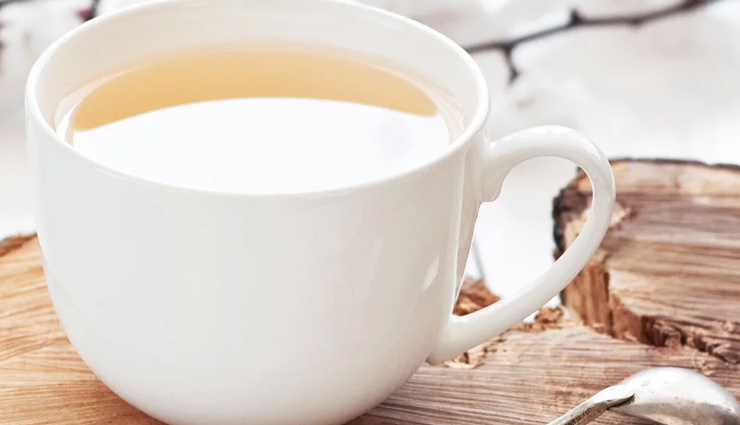
How To Make White Tea
In the quiet moments of solitude, there's something profoundly satisfying about crafting your own cup of tea. The delicate dance of leaves and water, the aroma that wafts through the air, and the anticipation of that first sip – it's a ritual that transcends mere preparation; it's an art form. And when it comes to white tea, the experience is nothing short of exquisite.
Here's how you can brew your own cup of perfection in the serene corners of your home:
What You Need:
2 teaspoons of white tea leaves
1 cup of water
Sweetener of your choice (optional)
Brewing Ritual:
-Begin by boiling the water until it reaches a gentle temperature of 75-85 degrees Celsius (170-185 degrees Fahrenheit). Let it whisper its warmth, preparing itself for the delicate infusion.
-Allow the water to rest for a minute, settling into a harmonious equilibrium.
- White tea leaves, like nature's confetti, gently unfurl in the water. They're not as compact as their counterparts; hence, embrace two teaspoons of white tea leaves to grace the water for your perfect cup.
- Let the blend steep, a transformation orchestrated over approximately five to eight minutes or longer, depending on your desired strength. Time becomes subjective, a choice to enhance the essence of your tea.
- With the patience of a tea connoisseur, strain the elixir into your cup, witnessing the metamorphosis of liquid gold.
- Should you desire a touch of sweetness, invite your chosen sweetener to the affair, allowing your tea to echo your taste preferences.
- Your cup of white tea, an embodiment of patience and precision, is now ready. Sip it slowly, savoring the poetry woven into every drop.
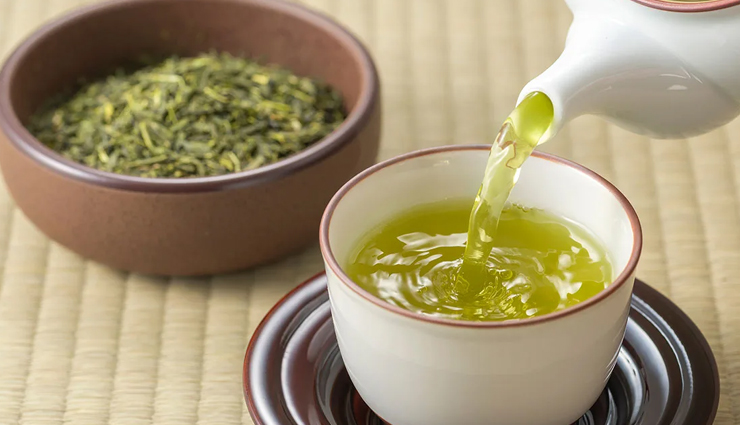
White Tea vs. Green Tea: The Brewing Battle
Ah, the eternal debate of tea aficionados – white tea versus green tea. Each variant holds its unique charm, but the contest for supremacy continues. Let’s delve into the depths of their differences and similarities, unveiling the intriguing aspects that set them apart:
Antioxidants: Both white tea and green tea boast antioxidants, but white tea takes the lead here. Its antioxidants, in both quantity and quality, surpass those found in green tea. These powerful compounds stand as guardians, shielding us from cardiovascular risks, high cholesterol levels, and the menacing specter of cancer. Additionally, they aid in the pursuit of weight loss.
Caffeine Content: For the caffeine-conscious, white tea emerges as the victor, containing a mere 15mg compared to green tea’s 20mg. This gentle touch makes it an excellent choice for those seeking a milder stimulant.
Taste: The bitter notes of green tea are well-known, often requiring a dash of sweetness to make them palatable. In this arena, white tea triumphs with its smooth, gentle, and slightly sweeter flavor profile. It's a delightful experience for the taste buds.
Availability: Here, green tea steals the show. It’s widely accessible, ensuring you can enjoy its benefits without burning a hole in your pocket. Finding genuine white tea, however, can be akin to discovering an oasis in the desert – a rare treasure, indeed.
Antimicrobial Properties: Surprisingly, white tea emerges as a formidable warrior against viruses, bacteria, and fungi. Studies have suggested its superior efficacy in combating pathogens like salmonella and staphylococcus, outshining its green counterpart.
White Tea: A Cup of Caution Amidst Health Benefits
While white tea unfolds a tapestry of health benefits, it's not entirely devoid of risks. Here’s a glimpse into the potential side effects:
Caffeine Content: Despite its low caffeine profile, white tea isn't caffeine-free, especially if derived from young leaves. Excessive caffeine intake can lead to insomnia, nervousness, agitation, dizziness, and other central nervous system disturbances. In larger quantities, it may cause gastrointestinal issues. Moderation is key to savoring its benefits without the jitters.
Iron Absorption: The abundant flavonoids in white tea, while beneficial, can hinder non-haem iron absorption by up to 70%. To mitigate this, consider consuming white tea between meals and separately from iron supplements, ensuring your body absorbs iron effectively.





